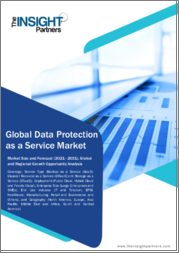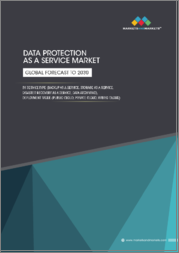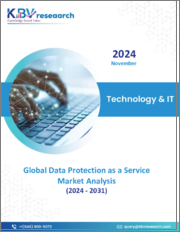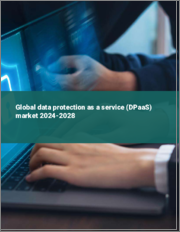
|
시장보고서
상품코드
1845757
DPaaS(Data Protection as a Service) 시장 : 서비스 유형, 배포 모델, 업계별, 지역별(2024-2031년)Data Protection as a Service Market By Service Type (Backup as a Service, Disaster Recovery as a Service ), Deployment Model, Vertical (Healthcare, BFSI, IT & Telecom), & Region for 2024-2031 |
||||||
DPaaS(Data Protection as a Service) 시장 평가 - 2024-2031
데이터의 급격한 증가, 진화하는 규제 프레임워크, 사이버 공격 위협 증가는 DPaaS(Data Protection as a Service)에 대한 수요를 증가시키고 있습니다. 기업이 방대한 양의 데이터를 생성하고 저장하는 상황에서 이러한 정보를 보호하는 것은 매우 중요해졌습니다. 기존의 데이터 보호 방식으로는 현대의 데이터 환경의 복잡성과 규모에 대응할 수 없는 경우가 많습니다. DPaaS는 클라우드 기반 서비스를 활용하여 확장성, 비용 효율성, 내결함성이 뛰어난 데이터 보호 솔루션을 제공하며, 2024년 시장 규모는 348억 달러를 넘어 2031년에는 878억 5,000만 달러에 달할 것으로 예측됩니다.
유럽에서는 일반개인정보보호규정(GDPR(EU 개인정보보호규정)), 미국에서는 캘리포니아주 소비자 프라이버시법(CCPA) 등 데이터 보호 관련 법규가 강화되고 있으며, 컴플라이언스 절차의 강화가 요구되고 있습니다. 컴플라이언스 위반은 막대한 벌금과 명예훼손으로 이어질 수 있습니다. DPaaS 기업은 데이터 암호화, 액세스 제어, 감사 추적 등 이러한 표준을 준수하도록 설계된 서비스를 제공함으로써 2024-2031년 연평균 12.27%의 연평균 복합 성장률(CAGR)로 시장을 성장시킬 수 있습니다.
서비스형 데이터 보호(DPaaS) 시장 : 정의/개요
DPaaS(Data Protection as a Service)는 백업, 복구, 재해복구 등 종합적인 데이터 보호를 매니지드 서비스의 일부로 기업에 제공하는 클라우드 기반 시스템입니다. 이 방식은 클라우드 컴퓨팅의 확장성, 유연성, 비용 효율성을 활용하여 데이터가 안전하게 저장되고, 자유롭게 액세스할 수 있으며, 데이터 유출 및 손상 발생 시에도 즉시 복구할 수 있도록 보장합니다.
DPaaS(Data Protection as a Service)는 백업, 복구, 암호화 등 다양한 기술을 통해 데이터를 보호하는 것을 목적으로 하는 클라우드 기반 서비스군을 말합니다. 데이터 백업 및 복구는 DPaaS의 주요 애플리케이션 중 하나입니다. 이 서비스를 통해 조직의 데이터는 정기적으로 오프사이트의 안전한 장소에 백업되어 하드웨어 고장, 사이버 공격, 자연재해로 인한 데이터 유출의 위험을 줄일 수 있습니다.
향후 DPaaS(Data Protection as a Service)의 도입으로 기업의 데이터 보안 및 컴플라이언스 대응 방식이 크게 변화할 것으로 예측됩니다. 사이버 위협이 더욱 교묘해지고 전 세계에서 데이터 프라이버시 규정이 강화되는 가운데, DPaaS는 기밀 데이터를 보호할 수 있는 확장 가능하고 비용 효율적인 솔루션을 제공합니다. On-Premise에 많은 시설과 리소스가 필요한 기존 데이터 보호 방식과 달리, DPaaS는 클라우드 기반 플랫폼을 사용하여 암호화, 자동 백업, 실시간 위협 감지 등 강력한 보안 조치를 구현합니다.
클라우드 배포이 DPaaS(Data Protection as a Service) 시장을 촉진하는가?
클라우드 컴퓨팅의 채택 증가는 DPaaS(Data Protection as a Service) 시장의 주요 촉진요인입니다. 기업의 데이터와 활동이 클라우드로 이동함에 따라 강력한 데이터 보호 솔루션의 필요성이 높아지고 있습니다. 가트너에 따르면 2023년 세계 퍼블릭 클라우드 최종사용자 지출은 2022년 대비 20.7% 증가한 5,923억 달러에 달할 것으로 예측됩니다. 이러한 클라우드 이용의 대폭적인 증가는 DPaaS 솔루션에 대한 수요 증가와 직접적으로 연관되어 있습니다. 또한 미국 국립표준기술연구소(NIST)에 따르면 연방 정부 기관의 92%가 클라우드 서비스를 도입하고 있으며, 이는 클라우드 기술이 산업 전반에 걸쳐 폭넓게 수용되고 있음을 보여줍니다.
DPaaS 시장을 주도하는 또 다른 중요한 측면은 데이터 보호와 프라이버시를 관리하는 법적 프레임워크의 확장입니다. 유럽연합(EU)의 일반 데이터 보호 규정(GDPR(EU 개인정보보호규정))과 캘리포니아주 소비자 개인정보 보호법(CCPA)과 같은 엄격한 규정으로 인해 기업은 종합적인 데이터 보호 솔루션에 투자할 수밖에 없습니다. 유럽 데이터 보호위원회(European Data Protection Board)에 따르면 GDPR(EU 개인정보보호규정) 벌금은 2022년 29억 2,000만 유로를 기록해 2021년 대비 168% 증가했습니다. 벌금 증가는 컴플라이언스와 데이터 보호 절차의 중요한 연관성을 강조하고 있습니다. 또한 국제 프라이버시 전문가 협회(IAPP)는 기업의 60%가 2022년에 프라이버시 관련 지출을 늘릴 것이며, 그 대부분이 클라우드 기반 데이터 보안 솔루션으로 향할 것이라고 밝혔습니다.
보안에 대한 우려가 DPaaS(Data Protection as a Service) 시장의 걸림돌이 되는가?
DPaaS(Data Protection as a Service) 시장은 몇 가지 중요한 촉진요인에 의해 빠르게 성장하고 있습니다. 그 중요한 요인 중 하나는 기업이 수집하고 보관하는 데이터의 양이 증가하고 있다는 점입니다. IDC(International Data Corporation)에 따르면 전 세계 데이터 영역은 2018년 33제타바이트에서 2025년 175제타바이트로 증가할 것으로 예측됩니다. 이러한 급격한 데이터 증가에는 종합적인 데이터 보호 솔루션이 필요하며, 많은 기업이 DPaaS를 도입하고 있습니다. 또 다른 중요한 요인은 사이버 공격의 빈도와 교묘함 증가입니다. FBI의 인터넷 범죄 신고센터(IC3)는 2020년 79만 1,790건의 사이버 범죄 신고를 접수했으며, 2019년 대비 69% 증가했고, 예상 손실액은 42억 달러가 넘습니다.
보안 문제가 클라우드 배포의 잠재적 억제요인으로 자주 언급되고 있지만, DPaaS 시장의 성장을 크게 둔화시킬 가능성은 낮습니다. 보안에 대한 우려는 많은 기업이 사내에 없는 고급 보안 기능과 전문성을 제공하는 DPaaS 솔루션을 채택하는 원동력이 되고 있습니다. 클라우드 보안 얼라이언스(Cloud Security Alliance)의 설문조사에 따르면 기업의 69%가 클라우드 기반 보안 솔루션으로 전환한 것으로 나타나 클라우드 보안에 대한 신뢰도가 높아지고 있음을 알 수 있습니다. 또한 DPaaS 프로바이더들은 보안 대책과 컴플라이언스 인증에 많은 투자를 하고 있으며, 이는 개별 기업의 역량을 넘어서는 경우가 많습니다.
목차
제1장 서론
- 시장의 정의
- 시장 세분화
- 조사 방법
제2장 개요
- 주요 조사 결과
- 시장 개요
- 시장 하이라이트
제3장 시장 개요
- 시장 규모와 성장의 가능성
- 시장 동향
- 시장 성장 촉진요인
- 시장 성장 억제요인
- 시장 기회
- Porter's Five Forces 분석
제4장 DPaaS(Data Protection as a Service) 시장 : 서비스 유형별
- Backup as a Service(BaaS)
- Disaster Recovery as a Service(DRaaS)
- Storage as a Service(STaaS)
- Security as a Service(SECaaS)
- 기타
제5장 DPaaS(Data Protection as a Service) 시장 : 배포 모델별
- 퍼블릭 클라우드
- 프라이빗 클라우드
- 하이브리드 클라우드
제6장 DPaaS(Data Protection as a Service) 시장 : 업계별
- 헬스케어
- BFSI(은행, 금융 서비스, 보험)
- IT & 통신
- 관공청
- 소매·E-Commerce
- 제조업
- 기타
제7장 지역 분석
- 북미
- 미국
- 캐나다
- 멕시코
- 유럽
- 영국
- 독일
- 프랑스
- 이탈리아
- 아시아태평양
- 중국
- 일본
- 인도
- 호주
- 라틴아메리카
- 브라질
- 아르헨티나
- 칠레
- 중동 및 아프리카
- 남아프리카공화국
- 사우디아라비아
- 아랍에미리트
제8장 시장 역학
- 시장 성장 촉진요인
- 시장 성장 억제요인
- 시장 기회
- 시장에 대한 COVID-19의 영향
제9장 경쟁 구도
- 주요 기업
- 시장 점유율 분석
제10장 기업 개요
- IBM
- Amazon Web Services(AWS)
- Hewlett Packard Enterprise(HPE)
- Dell Technologies
- Cisco Systems
- McAfee
- Commvault
- Rubrik
- Veeam
- Cohesity
- Druva
- Acronis
- StorageCraft
- Asigra
- Barracuda Networks
- Sophos
- Micro Focus
- Nutanix
- NetApp
- Hitachi Vantara
- Fujitsu
- ExaGrid
제11장 시장 전망과 기회
- 신규 기술
- 향후 시장 동향
- 투자 기회
제12장 부록
- 약어 리스트
- 전시와 참고 문헌
Data Protection as a Service (DPaaS) Market Valuation - 2024-2031
The exponential increase of data evolving regulatory frameworks, and the rising threat of cyber-attacks are all driving up the demand for Data Protection as a Service (DPaaS). As organizations generate and store massive volumes of data protecting this information has become critical. Traditional data protection methods frequently fall short of meeting the complexities and scale of modern data environments. DPaaS provides a scalable, cost-effective, and resilient data protection solution by leveraging cloud-based services by enabling the market to surpass a revenue of USD 34.8 Billion valued in 2024 and reach a valuation of around USD 87.85 Billion by 2031.
The growing stringency of data protection legislation such as the General Data Protection Regulation (GDPR) in Europe and the California Consumer Privacy Act (CCPA) in the United States needs more compliance procedures. Noncompliance might result in significant fines and reputational damage. DPaaS companies provide services that are designed to comply with these standards including data encryption, access control, and audit trails by enabling the market to grow at a CAGR of 12.27% from 2024 to 2031.
Data Protection as a Service (DPaaS) Market: Definition/ Overview
Data Protection as a Service (DPaaS) is a cloud-based system that offers comprehensive data protection to enterprises including backup, recovery, and disaster recovery as part of a managed service. This method takes advantage of the scalability, flexibility, and cost-effectiveness of cloud computing to ensure that data is safely stored, freely accessible, and immediately recoverable in the event of data loss or corruption.
Data Protection as a Service (DPaaS) refers to a set of cloud-based services aimed to protect data through a variety of techniques including backup, recovery, and encryption. Data backup and recovery is one of DPaaS's key applications. This service ensures that an organization's data is periodically backed up to safe off-site locations reducing the risk of data loss caused by hardware failures, cyber-attacks, or natural catastrophes.
The future adoption of Data Protection as a Service (DPaaS) is predicted to transform how enterprises approach data security and compliance. As cyber threats become more sophisticated and data privacy rules tighten globally, DPaaS provides a scalable and cost-effective solution for safeguarding sensitive data. Unlike traditional data protection approaches which can necessitate significant on-premises equipment and resources, DPaaS uses cloud-based platforms to deliver powerful security measures including encryption, automated backups, and real-time threat detection.
Will the Cloud Adoption Drive the Data Protection as a Service (DPaaS) Market?
The rising adoption of cloud computing is a major driver of the Data Protection as a Service (DPaaS) market. As enterprises progressively move their data and activities to the cloud, the necessity for strong data protection solutions has grown. According to Gartner, global public cloud end-user spending is expected to reach $592.3 billion in 2023 up 20.7% from 2022. This significant increase in cloud use is directly related to the growing demand for DPaaS solutions. Furthermore, the United States National Institute of Standards and Technology (NIST) states that 92% of federal agencies have implemented cloud services demonstrating the widespread acceptability of cloud technologies across industries.
Another important aspect driving the DPaaS market ahead is the increasing legal framework governing data protection and privacy. Stringent rules such as the European Union's General Data Protection Regulation (GDPR) and the California Consumer Privacy Act (CCPA), force firms to invest in comprehensive data protection solutions. According to the European Data Protection Board, GDPR fines hit a record €2.92 billion in 2022 representing a 168% rise over 2021. The increase in penalties highlights the crucial relevance of compliance and data protection procedures. Furthermore, the International Association of Privacy Professionals (IAPP) discovered that 60% of firms raised their privacy spending in 2022 with a large chunk going toward cloud-based data security solutions.
Will Security Concerns Hamper Data Protection as a Service (DPaaS) Market?
The Data Protection as a Service (DPaaS) market is expanding rapidly due to several important drivers. One key cause is the growing amount of data collected and retained by enterprises. According to the International Data Corporation (IDC), the global datasphere is expected to increase from 33 zettabytes in 2018 to 175 zettabytes by 2025. This exponential data increase needs comprehensive data protection solutions prompting many enterprises to adopt DPaaS. Another important driver is the increasing frequency and sophistication of cyberattacks. The FBI's Internet Crime Complaint Center (IC3) received 791,790 cybercrime complaints in 2020, up 69% from 2019 with possible losses exceeding $4.2 billion.
While security issues are frequently mentioned as potential impediments to cloud adoption, they are unlikely to materially slow the growth of the DPaaS market. Security concerns are driving many firms to adopt DPaaS solutions which provide advanced security features and expertise that many enterprises lack in-house. According to a Cloud Security Alliance poll, 69% of enterprises are shifting to cloud-based security solutions demonstrating that cloud security is becoming more trusted. Furthermore, DPaaS providers often invest considerably in security measures and compliance certifications which frequently exceed the capacity of individual enterprises.
Category-Wise Acumens
Will the Safety and Recoverability Influence the Service Type Segment?
Backup as a Service (BaaS) is now the most popular service type. This dominance might be linked to the enterprise's fundamental requirement to secure the security and recoverability of critical data. BaaS offers a simple and effective alternative for outsourcing backup activities to a third-party service. This arrangement eliminates dependency on on-premises hardware and streamlines backup administration making it an appealing alternative for enterprises wishing to improve their data security methods without incurring large capital costs. As enterprises appreciate the significance of protecting their data from loss and corruption, BaaS provides a dependable and scalable method to backup that is in line with the growing acceptance of cloud-based solutions.
Backup as a Service (BaaS) is now the most popular service type. This dominance might be linked to the enterprise's fundamental requirement to secure the security and recoverability of critical data. BaaS offers a simple and effective alternative for outsourcing backup activities to a third-party service. This arrangement eliminates dependency on on-premises hardware and streamlines backup administration making it an appealing alternative for enterprises wishing to improve their data security methods without incurring large capital costs. As enterprises appreciate the significance of protecting their data from loss and corruption, BaaS provides a dependable and scalable method to backup that is in line with the growing acceptance of cloud-based solutions.
Will the Cost-Efficiency and Scalability Drive Growth in the Deployment Model Segment?
The public cloud deployment option is currently preferred due to its cost-effectiveness and scalability. Public cloud DPaaS solutions are hosted and managed by third-party cloud providers eliminating the need for businesses to spend considerably in their own data centers or IT infrastructure. Businesses benefit from rapid deployment under this paradigm since the service provider manages and maintains all components of the infrastructure. The public cloud's scalability also allows enterprises to tailor their data protection resources to their specific demands without incurring additional capital costs. This flexibility is especially tempting to small and medium-sized businesses (SMEs) and startups which may lack the financial resources or experience to maintain large on-premises systems.
However, the hybrid cloud deployment paradigm is gaining popularity since it provides a balanced approach integrating the benefits of both public and private cloud environments. Hybrid DPaaS solutions enable businesses to use public cloud resources for non-sensitive data and apps while keeping private cloud environments for mission-critical workloads and sensitive information. This strategy allows you to increase resources as needed while ensuring that sensitive data is secure and in compliance with regulatory regulations. The hybrid approach answers the needs of companies that need more control and customization for their data protection strategies, particularly those working with highly sensitive or regulated data. Hybrid cloud DPaaS solutions that integrate with current IT infrastructure provide a customized solution that can adapt to diverse data protection demands.
Country/Region-wise Acumens
How will Increase in Spending on Data Protection Solutions and Cloud-Based Services Impact the Market in the North America?
The Data Protection as a Service (DPaaS) market in North America is rapidly expanding owing mostly to increase in spending on data protection solutions and cloud-based services. One of the primary causes is the increasing volume of data generated by businesses and individuals combined with a growing awareness of data privacy and security concerns. According to the United States Bureau of Economic Analysis, the digital economy accounted for 9.6% of the total US GDP in 2019 showing the growing importance of digital data in the economy. The increase in digital data has prompted enterprises to invest more in comprehensive data protection solutions.
The North American area, notably the United States, dominates the worldwide DPaaS market due to a variety of factors. To begin, the region boasts a large concentration of technological enterprises and early adopters of cloud technologies. Stringent data protection rules such as the California Consumer Privacy Act (CCPA) and Canada's Personal Information Protection and Electronic Documents Act (PIPEDA) have forced businesses to invest in comprehensive data security solutions. According to the International Association of Privacy Professionals (IAPP), 65% of US corporations want to raise their privacy spending in 2020 with an average budget of $2.2 million. Furthermore, the region's advanced IT infrastructure and high internet penetration rate encourage broad use of cloud-based services.
Will the Growing Adoption of Managed Services and Security Solutions Boost the Market in the Asia Pacific Region?
The Asia Pacific Data Protection as a Service (DPaaS) industry is expected to grow significantly owing to many major factors. One key driver is the fast digital transformation of sectors which results in greater data collection and the need for strong security measures. According to an Asian Development Bank report, digital transformation has the potential to boost Asia's GDP by $1.16 trillion in 2025. This digital transformation is driving enterprises to implement enhanced data protection solutions. Another important driver is the strict regulatory environment. For example, China's Personal Information Protection Law (PIPL) which went into effect in 2021 established additional data protection rules encouraging firms to seek compliant DPaaS solutions.
The fastest-growing segment of the Asia Pacific DPaaS market is expected to be cloud-based disaster recovery services. This rapid expansion can be linked to the rising frequency and sophistication of cyber threats in the region. According to Cybersecurity Ventures, cybercrime will cost the globe USD 10.5 Trillion per year by 2025 with the Asia Pacific region bearing a disproportionate share of the cost. The increasing awareness of these hazards is causing firms to prioritize disaster recovery solutions. Furthermore, the low cost and scalability of cloud-based services appeal to the region's vast number of small and medium-sized organizations (SMEs).
Competitive Landscape
The Data Protection as a Service (DPaaS) Market is a dynamic and competitive space, characterized by a diverse range of players vying for market share. These players are on the run for solidifying their presence through the adoption of strategic plans such as collaborations, mergers, acquisitions, and political support. The organizations are focusing on innovating their product line to serve the vast population in diverse regions.
Some of the prominent players operating in the data protection as a service market include:
Asigra, Inc.
Amazon Web Services, Inc.
Cisco Systems, Inc.
Commvault Systems, Inc.
Dell, Inc.
HP Development Company L.P.
IBM
Microsoft
NetApp, Inc.
Oracle
Quantum Corporation
Veritas Technologies
Latest Developments
In June 2022, The United Nations Capital Development Fund (UNCDF) and the Personal Data Protection Office (PDPO) launched a data protection and privacy portal to facilitate the processing, reporting, and resolution of data privacy and protection complaints and breaches. It would also facilitate the registration of individuals and organizations that process and gather personal data. The site features SMS/USSD capability, ensuring that most citizens may use and access it.
In September 2022, Asigra Inc., an ultra-secure backup and recovery provider, announced the general launch of Tigris Data Protection software with Content Disarm & Reconstruction (CDR). Asigra's extensive suite of security features now includes CDR, making it the most secure backup and recovery software platform on the market.
Data Protection as a Service (DPaaS) Market, By Category
- Service Type:
- Backup as a Service (BaaS)
- Disaster Recovery as a Service (DRaaS)
- Storage as a Service (STaaS)
- Security as a Service (SECaaS)
- Deployment Model:
- Public Cloud
- Private Cloud
- Hybrid Cloud
- Vertical:
- Healthcare
- BFSI (Banking, Financial Services, and Insurance)
- IT & Telecom
- Government & Public Sector
- Retail & eCommerce
- Manufacturing
- Others
- Region:
- North America
- Europe
- Asia-Pacific
- South America
- Middle East & Africa
TABLE OF CONTENTS
1. Introduction
- Market Definition
- Market Segmentation
- Research Methodology
2. Executive Summary
- Key Findings
- Market Overview
- Market Highlights
3. Market Overview
- Market Size and Growth Potential
- Market Trends
- Market Drivers
- Market Restraints
- Market Opportunities
- Porter's Five Forces Analysis
4. Data Protection As A Service (DPaaS) Market, By Service Type
- Backup as a Service (BaaS)
- Disaster Recovery as a Service (DRaaS)
- Storage as a Service (STaaS)
- Security as a Service (SECaaS)
- Others
5. Data Protection As A Service (DPaaS) Market, By Deployment Model
- Public Cloud
- Private Cloud
- Hybrid Cloud
6. Data Protection As A Service (DPaaS) Market, By Vertical
- Healthcare
- BFSI (Banking, Financial Services, and Insurance)
- IT & Telecom
- Government & Public Sector
- Retail & eCommerce
- Manufacturing
- Others
7. Regional Analysis
- North America
- United States
- Canada
- Mexico
- Europe
- United Kingdom
- Germany
- France
- Italy
- Asia-Pacific
- China
- Japan
- India
- Australia
- Latin America
- Brazil
- Argentina
- Chile
- Middle East and Africa
- South Africa
- Saudi Arabia
- UAE
8. Market Dynamics
- Market Drivers
- Market Restraints
- Market Opportunities
- Impact of COVID-19 on the Market
9. Competitive Landscape
- Key Players
- Market Share Analysis
10. Company Profiles
- IBM
- Amazon Web Services (AWS)
- Hewlett Packard Enterprise (HPE)
- Dell Technologies
- Cisco Systems
- McAfee
- Commvault
- Rubrik
- Veeam
- Cohesity
- Druva
- Acronis
- StorageCraft
- Asigra
- Barracuda Networks
- Sophos
- Micro Focus
- Nutanix
- NetApp
- Hitachi Vantara
- Fujitsu
- ExaGrid
11. Market Outlook and Opportunities
- Emerging Technologies
- Future Market Trends
- Investment Opportunities
12. Appendix
- List of Abbreviations
- Sources and References


















